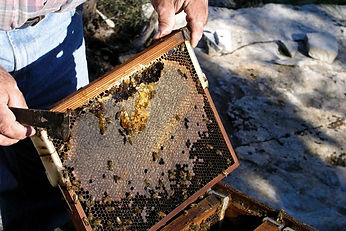Olive oil & olives
Our superior quality extra virgin olive oil is produced with Koroneiki olives that grow in the groves just outside Kalamata in the southwestern Peloponnese. Since antiquity, Kalamata has been one of the most famous olive oil producing areas in the world and is recognized by the European Union for its exceptional quality of olive oils. Only extra virgin olive oils produced by mechanical methods and bottled in this region can have P.D.O. (Protected Designation of Origin) status. Our oil is produced and bottled by Spiros Tzavaras, a family business spanning three generations (in the photo on the right you can see Spiros and his father sorting through olives during harvest time). Extra virgin olive oil from this area has been shown to have a particularly high number of polyphenols - phytochemicals that demonstrate anti-oxidant properties and are widely held by medical researchers to have a range of positive health benefits.
Our olives are also produced by Spiros. One by one they get sifted through to remove any that are bruised and pickle only the good ones - it does not get more artisanal than this! The olives are immersed in a vinegar/salt solution that allows them to keep for a long time at room temperature.
Tomatoes



Modern tomato farming techniques have resulted in producing tomatoes and tomato products that have close to no tomato flavor. Plants that produce thick-skinned tomatoes of uniform size and shape that ripen simultaneously to facilitate their harvest and transport are preferred. Frequent irrigation, extensive use of fertilizers, insecticides and weed killers all help to increase their production as much as possible but reduce their flavor.
Alexandros Gousiaris, a mathematician turned beekeeper / tomato conserve producer in Karditsa, in the heart of Greece's fertile Thessaly plains, cultivates an heirloom seed, which has been passed down for several generations in his family. Heirloom tomatoes are treasured old tomato varieties which are exceptional with regards to flavor. No chemical fertilizers, insecticides or weed killers are used in their cultivation at the Gousiaris farm - they are certified organic. Frequent watering is not necessary because this specific variety grows a dense stem and leaf system that absorbs and retains moisture. The tomatoes do not all ripen simultaneously - on any given plant, buds, flowers, green tomatoes, and red ripe tomatoes are all present, as nature intended and the tomatoes must be picked by hand. The tomatoes are not uniform in size or shape, but are bright red and thin-skinned and, although these are all commercially unattractive traits, they produce something which nowadays is quite rare: a passata that captures true tomato flavor.
Honey
Honey was prized in ancient Greece just as much as olive oil and wine. Ambrosia, or nectar, was afterall the food of the Gods of Olympus. The practice of apiculture, or beekeeping, in Greece dates back to at least 3,500 BC. Honey was held in high esteem in daily life, as much as food and medicine. It is mentioned in the texts of Homer, Plato, Aristotle and Democritus. Hippocrates, the father of medicine, emphasized the nutritional and pharmaceutical value of honey. Honey contains anti-bacterial, anti-viral and anti-fungal substances. It has been used for centuries to treat sore throats, coughs, and as an effective anti-microbial agent to treat minor burns, cuts and bacterial infections.
Greek honey is globally famous for its exceptional quality, unique aroma and nutrional value. Its taste is due to the great diversity of Greek flora, which consists of numerous wild herbs (thyme, lavender, oregano, sage). Apipharm is a small family business dedicated to sourcing raw Greek honey. The company has long standing relationships with many artisanal beekeepers across Greece and it packages and sells their honey under a single brand.



